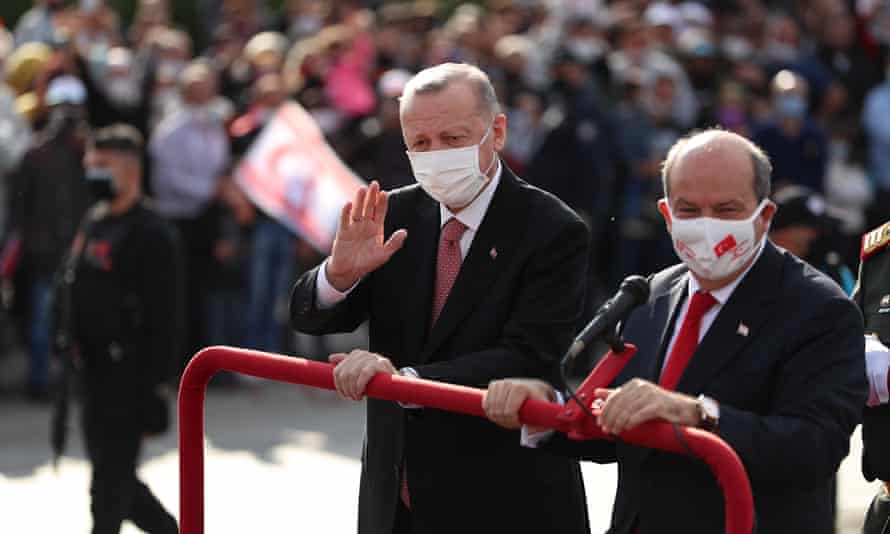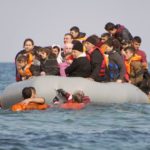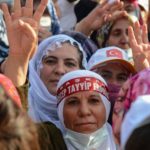It’s been nine months since Ersin Tatar assumed the presidency of the self-declared Turkish republic of northern Cyprus and, like his predecessors, he has found little has changed.
Embargos, international isolation and political restrictions remain perennial problems for his unrecognised state. Even today, nearly 38 years after the territory proclaimed independence, foreign dignitaries pass through his colonial-era office and still object to being photographed next to the flags on his desk.
“They’re afraid of the Greek Cypriots telling them off,” said the self-avowed nationalist, pointing to the Turkish and Turkish Cypriot ensigns positioned either side of a portrait of Kemal Ataturk behind him. “Our friends in the south will do everything they can to stop us from being able to prosper … their policy is to stifle us until we give up.”
Still, Ersin is in ebullient mood.
Ahead of his mentor, Turkish president Recep Tayyip Erdoğan, visiting the territory on Tuesday to commemorate Turkey’s 1974 invasion – a “peace operation,” he contends, that saved his people from “certain extermination” – he appears to be on a roll. “In Turkey he’s treated like a pop star,” one aide said. “People come up to him in the streets. He loves it.”
At 60, the Cambridge-educated politician attributes the public displays of enthusiasm to Erdoğan himself. Ankara, he insists, has not only stood by the statelet through some “hard and lonely” times; from the outset the Turkish president has embraced his proposal of a two-state solution to the Cyprus problem after years of failed peace talks aimed at uniting the Mediterranean island in a bi-zonal, bi-communal federation.
“People think [he] instructed me to follow his policy. That is not true. I am the man who convinced Erdoğan that after all these federation opportunities had been exhausted we should go for this two-state solution,” he told the Guardian, downplaying the EU’s refusal to discuss a settlement along such lines.
“He supported me and is very happy to do so because Turkish public opinion has bought it … For 85 million Turks, Cyprus is a very high-powered national issue. I have always said that the only way forward to a realistic solution is a two-state solution.”
Turkish Cypriots, he says, are not only indebted to a motherland that intervened militarily to safeguard the minority in 1974 – following an Athens-inspired coup aimed at union with Greece – but a protector that has also bankrolled them to the tune of about $300m annually. To this day, Turkey is the only country to recognise the entity.
“We obviously have people like Mustafa Akinci [his moderate predecessor] and others who think otherwise but they are not in power,” said Tatar. “I am now in power … and I am the president of Turkish Cypriots all over, here, in Turkey, in England, Canada and Australia.”
The invasion in 1974 resulted in Turkish troops seizing 37% of Cyprus in the name of what was then 18% of its population. Ever since, both communities have been forced to live either side of a UN-patrolled ceasefire line, symbolic of the inability of mediators to solve the west’s longest-running diplomatic dispute. At the height of the conflict, about 250,000 Greek Cypriots were displaced from their homes, pushed into what is now the internationally recognised south.
In the history of the breakaway republic, no election has been as contentious as that of Tatar elevated to the post after garnering only 4,000 votes more than the leftwing Akinci, a vocal opponent of policies his own supporters have long feared will lead to the north’s annexation by Turkey.
Turkish Cypriots opposed to a settlement that would seal the island’s permanent division, claim that without Ankara’s flagrant interference in the run-up to the October poll, victory would never have been secured for the conservative National Unity party leader. A recent report, released after months of inquiry by lawyers, academics, activists and researchers, concluded the ballot had been riddled with irregularities, including bribes-for-votes and threats against Akinci, his family and close associates.
“Tatar was handed the election on a plate,” said Mine Atli, a Turkish Cypriot lawyer who was among the report’s authors. “The Turkish embassy in [northern] Nicosia was turned into an election campaign headquarters. Tatar is merely a puppet of the Erdoğan administration … we are the real owners of this island, not them, and so we will decide its future.”
Celebrations marking the 47th anniversary peak on Tuesday when Erdoğan is expected to tour the ghost town of Varosha – a Greek enclave that has remained untouched but which Ankara controversially decided to reopen before the election in a step that is also thought to have swung the vote. Like the visit, the move to include Varosha in the tour has been derided as a stunt aimed at currying favour with nationalists back home at a time of domestic problems for the strongman. “He will use Cyprus like Margaret Thatcher used the Falklands,” said Atli, who was raised in Britain.
Marking their disapproval, opposition MPs, many appalled by Erdoğan’s authoritarianism, boycotted parliament when the leader addressed lawmakers on Monday.
For Turkish Cypriots who support reunification under the roof of a shared federation and have taken to the streets in the past in protest over the territory’s creeping Islamisation, the softly spoken Tatar is their worst nightmare. Many have applied for Republic of Cyprus passports – issued by the south – and fled, leaving the north to become inhabited by socially conservative settlers from Anatolia.
The visit is being watched closely by the EU. But while the European Commission president, Ursula von der Leyen, says the bloc will “never, ever” accept a solution that would legitimise the permanent partition of a member state, the Turkish Cypriot leader remains seemingly unperturbed.
If there is no solution, ties with Turkey will inevitably deepen, he says, even if he also cherishes the idea of his people one day joining Europe.
“I want to be in Europe and Turkey has not told me there is no such policy … but unless we recognise the realities on the island, we won’t reach an agreement and the status quo will prevail,” he said. “Turkish Cypriots will still be under embargo and isolation, restricted and without a recognised state … but we will adjust accordingly.”
By: Helena Smith
Source: Guardian



